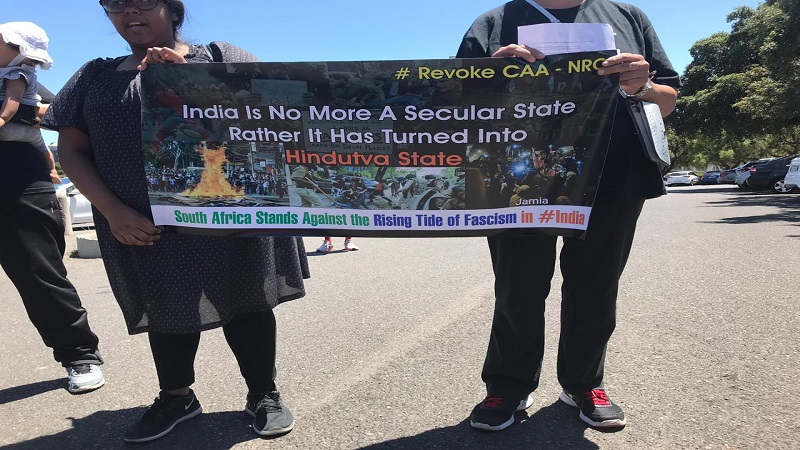By Tasneem Adams
A South African human rights group raising awareness on growing fascism and discrimination under the regime of Narendra Modi says South Africans must become more conscientized on the political realities in India. In December, Indian lawmakers passed the Constitutional Amendment Act (CAA), which would give citizens of Afghanistan, Pakistan and Bangladesh the opportunity to apply for Indian citizenship. But the Bill only applies to those of the Hindu, Christian, Sikh, Jain, Parsi or Buddhist faith and effectively excludes Muslims.
The CAA essentially undermines the country’s secular constitution and is just one of many measures by the Hindu nationalist Bharatiya Janata Party (BJP) to reshape India into a Hindu state. Critics have argued that the legislation will turn Muslim Indians into second-class citizens.
Compounding this is the implementation of the National Register of Citizens (NRC), an official record of those who are legal Indian citizens. However, there are fears the NRC will enable the government to identify people who have been living in India illegally, detain them and deport them to where they came from.
Mass rallies have erupted across India since December with people of all faiths and backgrounds raising their voices. However, police have used excessive force on protestors and have cracked down on mostly Muslim areas. More than 24 people have been killed in the protests.
South Africa is home to the largest population of people of Indian descent on the continent, with 1.5 million, according to Stats SA. For the Indian diaspora, many of whom have deep links with their ancestral country, the discrimination against Muslims in India has become a painful issue.
“It affects us because of the historical links, but because we are part of BRICS. What is South Africa’s position on the human rights abuses that have emanated in the clamping down of this unjust legislation? The number of citizens that have been arrested that are lawfully and peacefully protesting in India should speak to us as South Africans who understand oppression and discrimination,” says Prof Mahmoud Patel, an international legal activist.
Patel is a member of People Against Apartheid & Fascism, a South African collective of human rights activists, who have mobilised and held protests in response to the CAA and the NRC.
PAAF hosted a dialogue reflecting on Apartheid, the rise of the Right globally and the crisis in India in Cape Town on Sunday, where seven panellists reflected on these political developments.
PAAF said it was agreed that dialogues are necessary, and must continue, in order to bring awareness around CAA/NRC, it’s impact and consequences and the fact that it is a symptom of a “repugnant” Hindutva ideology. The BJP is a staunch advocate of hindutva (“Hindu-ness”), an ideology that seeks to define Indian culture in terms of Hindu values.
“This is not an Indian thing only. It is for all of us to stand up against right wing, fascism and oppression and legislation that goes against the human values of those who aspire for equality, justice and human dignity,” stressed Patel.
What has been stark however is the South African government’s lack of response on the matter. Patel described it as a “stoic silence.”
“The response from the South African government on India and occupied Kashmir has been absolutely disgusting. To stand up and give lip service to struggles that you feel will elicit support from a particular electorate…” he said referring to South Africa’s downgrading of the Israeli embassy but at the same time conducting trade with Zionist Israel.
Patel pointed to the issue of “economics” as an underlying factor which drives South Africa’s often-confusing human rights policy.
“At those levels, it’s inimical to the plight of South Africans here as well. The muted silence from DIRCO on these issues leaves a lot wanting from people in power.”
Some of the leading Hindu organisations in South Africa have also kept mum on the issue, while others have defended the Modi regime’s policies as a bid to give protection to Hindus facing persecution in other countries.
“There is nothing forthcoming. This is very similar to how Israel deals with the Palestinians…if questions are posed, there is a refusal to engage but rather point fingers elsewhere. They [Israeli’s] shift the debate without focusing on what’s happening,” said Patel.
“When people say they don’t want to engage, it means their neutrality is complicit with those who are committing the wrongs they are doing. You cannot be neutral in the face of oppression.”
However, Patel cautioned that people should be careful not to create “unnecessary divisions” at the expense of constructive engagement.
“There are some voices from the Hindi community like Dr Saths Cooper who are saying we must stand up to this madness. But I think its important to continue to engage on these issues and that we respond to oppression not just in India, but locally and the global community. We have a moral obligation and duty to question those who are abusing their positions of power.”
PAAF is currently working on a strategy to organise South African civil society to stand in solidarity with the oppressed in India. VOC






 WhatsApp us
WhatsApp us 

